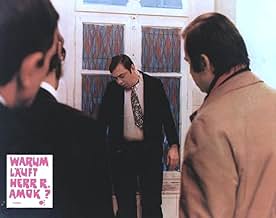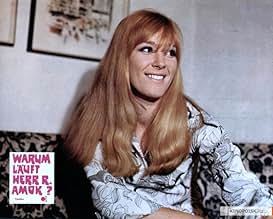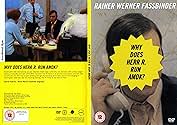Pourquoi monsieur R. est-il atteint de folie meurtrière?
Ajouter une intrigue dans votre langueWith slicked-down hair and three-piece suits, dependable Herr Raab is a technical draftsman. He gets along with his colleagues although his boss wants him to go beyond technical cleanliness ... Tout lireWith slicked-down hair and three-piece suits, dependable Herr Raab is a technical draftsman. He gets along with his colleagues although his boss wants him to go beyond technical cleanliness to problem solving. He's a dutiful husband; his wife's a social climber and pushes him to ... Tout lireWith slicked-down hair and three-piece suits, dependable Herr Raab is a technical draftsman. He gets along with his colleagues although his boss wants him to go beyond technical cleanliness to problem solving. He's a dutiful husband; his wife's a social climber and pushes him to seek a promotion, but they also share sweet moments. He's a caring father, helping his son... Tout lire
- Réalisation
- Scénario
- Casting principal
- Récompenses
- 3 victoires et 2 nominations au total
- Kollege im Büro
- (as Harry Bär)
- Opa Raab
- (as Herr Sterr)
- Oma Raab
- (as Frau Sterr)
- Schallplattenverkäuferin
- (as Carla Aulaulu)
Avis à la une
From the beginning he is simply not there, as Patrick Bateman would put it. When his colleagues make jokes, he walks with them, but not laughs with them. When his wife brings a friend, we see his narrow-mindedness. She is self-assured and liberal with no clue of what to do with her life, something Kurt is unable to understand. He needs order. He is order. He trys to have everything perfect in his sense, he works technically perfect like a machine, but lacks (human) ideas, or tries to cure his son's speech problems, but he always fails.
His system of perfection does not work. He does not work. And it keeps going on. You see Kurt in different allday situations, where he doesn't behave (all too) strange in a obvious way. But watch him more carefully and you see that he's empty. He holds down all emotions. In a banal situation, when he sees that his life is not perfect at all, and unable to adjust his system to the others like he always was, he tries to make his life perfect by eliminating all disturbing factors. He runs amok. And he does so as he always did: Emotionless.
What Fassbinder wants to show us, is what lies beneath the human fassade. We never know what a person really thinks or feel, because we're all masters of disguise and on the other hand unable or unwilling to find out (another) one's real feelings. And that can be dangerous.
Highly sensitively Fassbinder gives insight into the life of a man that runs amok. Fassbinder succeeds in showing the motives of a crazy amok run.
If you don't know any of Fassbinders movies you must be aware that this is different than anything you know. Fassbinder portrays a man that lacks self-awareness and is poor of showing his emotions and who does not do more than he is asked for in his job. Herr R. is slow in mind and words. And yet, all that does not accumulate to his amok run. What does is hidden behind a surface that Fassbinder discloses one by one... 9 out of 10.
Fassbinder pulls it off marvellously in 'Why Does Herr R. Run Amok?', one of his best early films, from 1970. This particular punchline connects as hard as a blow to the back of the head.
If a life can only be understood backwards, this film parodies the theory by emulating it.
Fassbinder's nihilism knew no bounds.
Although Fassbinder is credited as writing and directing this film, it has since come to light that he probably did neither. The writing was largely improvisation, and the directing was exclusively Michael Fengler (a longtime Fassbinder collaborator).
Frankly, I am glad that this is not a real Fassbinder because he makes some excellent movies... but, for me, this would not be one of them. It just runs on, with people rambling for the entire duration. The reviews tend to be positive, but I see it as a film where nothing happens. And not in a funny way, just in a very pointless way.
Le saviez-vous
- AnecdotesIn 2003 on a interview for Village Voice Hanna Schygulla claimed that this film was completely done by director Michael Fengler, whereas purported co-director Rainer Werner Fassbinder had nothing to do with the actual film. She also claimed that film was almost completely improvised which wasn't Fassbinder's way to make movies. Fassbinder still is credited as director and writer on the actual film and on many official sources, including Fassbinder Foundation's website. This fact has been confirmed by Michael Fengler himself in the 2008 documentation Gegenschuss - Aufbruch der Filmemacher (2008). He reported, that Fassbinder was involved neither in writing nor in directing of the movie and has visited the movie set at most twice during shooting.
- GaffesWhen Herr R. leaves the doctor the camera team can be seen in the mirror on the wall.
- ConnexionsFeatured in Sehnsucht nach Sodom (1989)
Meilleurs choix
- How long is Why Does Herr R. Run Amok??Alimenté par Alexa
Détails
- Date de sortie
- Pays d’origine
- Langue
- Aussi connu sous le nom de
- Why Does Herr R. Run Amok?
- Lieux de tournage
- Müllerstraße 40, Munich, Bavière, Allemagne(bureau, Franz Maron, Architekt/Dipl. Ing.)
- Sociétés de production
- Voir plus de crédits d'entreprise sur IMDbPro
Box-office
- Budget
- 135 000 DEM (estimé)
- Durée1 heure 28 minutes
- Mixage
- Rapport de forme
- 1.37 : 1
Contribuer à cette page


















